#tyndareus
Explore tagged Tumblr posts
Text

Odysseus advises king Tyndareus concerning Helen's suitors
Illustration by Howard Pyle
#i've got this brilliant plan#which will definitely not backfire#can I marry your niece now?#odysseus#greek mythology#tyndareus#the oath of tindareus#trojan war#helen of sparta#helen and menelaus#tagamemnon#art#illustration
44 notes
·
View notes
Text
Okay an Agamemnon-friendly post so you are warned! The post is inspired by another made by @hermesmoly
As you know the sources that absolutely HATE Agamemnon speak among others on traditions rescued or invented by post-homeric sources that Agamemnon killed the husband and children of Clytemnestra to have her as a wife. Some of it I memorize it to my mini-analysis here:
And of course Tyndareus would have absolutely no clue who killed them lol 😂 like "oh what do you know! They are dead. Hey you! You are tall and handsome have my daughter for wife!" And then Menelaus with Tyndareus and the Spartan army helps Agamemnon to take Mycenae back from Aegisthus.
Wait, Aegisthus who? Yup we know Aegisthus who was their cousin and was the reason they got exiled in the first place. His coup was reversed and then Agamemnon established himself back to authority and dedicated himself to expanding Mycenaean influence and area till he made it the most powerful kingdom in Greece. But Aegisthus came back; years later he became Clytemnestra's lover and the two of them conspired the murder of Agamemnon and after they succeeded they ruled for years till Orestes took his revenge.
Aegisthus is my proof not to support the idea that Agamemnon slaughtered Clytemnestra's family to get to marry her. Even if one can say he was desperate to get back to power, even if someone says he lost it for some reason and wanted to get revenge quickly, even if we say that no one ever knew (and in Eurypedes it is not even the case! Apparently every interested party knew haha) I don't think it is plausible to say he conspired for the murder of the family of Clytemnestra. He did many things and as I mention to the analysis he doesn't seem meant to be a pleasant character but no I am not convinced it is plausible he conspired or executed the murder of Clytemnestra's family.
The dude didn't even plan the assassination of Aegisthus who was the reason to exile him!
Food for thought
#greek mythology#tagamemnon#homeric poems#agamemnon#aegisthus#katerinaaqu analyzes#clytemnestra#orestes#agamemnon and clytemnestra#house of atreus#menelaus#agamemnon and menelaus#tyndareus#food for thought#random thoughts#thoughts from my brain#thoughts from the void
44 notes
·
View notes
Text
I got curious about how Menelaos gets chosen in various sources and made a little list*: -In the Catalogue of Women, Tyndareos chooses/Menelaos wins because he offers the most bride gifts. [The oath is Tyndareos' idea, as far as we can tell.] -In Stesichorus' Helen (so, the probable first version of his that treated Helen and the Trojan war, not either of his Palinodes), Tyndareos chooses after exacting the oath to keep order and the suitors from fighting each other. [No way to tell if Tyndareos came up with the oath himself or was given the idea, by Odysseus or anyone else.] -In Euripides' Iphigenia in Aulis, Tyndareos allows Helen to choose after exacting the oath as the suitors have begun threatening each other. [Tyndareos comes up with the idea of the oath himself.] -In the Bibliotheke, Tyndareos chooses. [Odysseus is the brain behind the oath.] -In Hyginus' Fabulae (#78), Helen gets to choose because Tyndareos is afraid of the discord that might arise and that Agamemnon might divorce Klytaimnestra. [Odysseus is again the brain behind the oath.] *Based on checking those sources I knew mentioned it plus Gantz's Early Greek Myth, since he's thorough in mentioning if later sources talk about something even if the focus is on earlier ones.
So what we've got is that most of the time in these sources, Tyndareos is the one to choose. In the Catalogue of Women the man chosen is also the one that, on the crassest level, is the most "worthy" by having given most for the woman. (Though it's also the source that notes if Achilles had been old enough, he would have won Helen.) Of course, if there are lost sources that touched on the suitors and Helen's marriage to Menelaos, we won't know that, or what they said about it, but this is what we've got to work with, I'm rather sure.
Tyndareos choosing is of course the most "neutral"/normative option, as that would be the regular course of things. Tyndareos being the one to choose also doesn't appear to have any correlation (as far as we can tell, anyway) whether Helen left or was kidnapped. As in, there's no correlation to whether Helen is portrayed as "guilty" or not when her father has chosen her husband.
Helen choosing comes into play for the first time in Iphigenia in Aulis, and the context of it paints a rather specific picture, I'd say.
"[...] old Tyndareus with no small cleverness had beguiled them by his shrewd device, he allowed his daughter to choose from among her suitors the one towards whom the sweet breezes of Aphrodite might carry her."
"[...] carried Helen off, in mutual desire, to his steading on Ida."
First of all, of course one could probably say much since this is all part of a speech of Agamemnon's. But, if we're allowing what's being said to stand on its own (and if there is an agenda, which undoubtedly there is, it might be Agamemnon's just as much as about how the play, meta-wise, is choosing to represent this), something becomes very clear. Tyndareos is put forth as basically tricking the suitors, and so it puts blame on him. Helen, in being allowed to choose, is made culpable since she then still desired someone not her husband and because of that desire let herself be carried off. The chorus a little later after this both uses "carried off" as well as "fled her home to marry a foreigner". It's thus not just Agamemnon who is framing it both in terms of "kidnapping" and Helen leaving because she desires Paris.
In Hyginus we have no moral flavouring of the same kind as above, since the Fabulae are so very pared down in their language. At most it's a far more neutral casting of Helen being allowed to choose than how Iphigenia in Aulis has it. (But it's probable Hyginus got "Helen got to choose" from that play, much like Euripides and Sophocles' Alexander plays are probable sources for his own account of how Paris comes back to Troy.)
The wider context in which Helen getting to choose her own husband and how it's being portrayed is actually rather important, then, being used as it is in conjunction with Helen being portrayed as desiring Paris. And I think it's kind of interesting how Tyndareos is apparently at first perfectly capable of coming up with the idea of the oath himself, but as soon as Odysseus in later sources worms his way into the narrative, him having come up with it is the version that dominates (especially in later awareness of the story)!
74 notes
·
View notes
Text
You know all of those greek vase paintings that have a bunch of Helen's family (usually Leda, Tyndareus and the Dioscuri but occasionally Clytemnestra too) gathered around an unhatched or newly hatched Helen-egg on an altar?
If we follow along with the fact that this pottery almost always depicts the Dioscuri grown up, and Leda in myth has the Dioscuri, Clytemnestra and Helen at the same time, AND assume they all had separate eggs (or at least Helen had a separate egg). You could headcanon that Helen simply took a very, very long time to hatch.
Therefore, I think it's also fun to headcanon that members of her family visit this egg often prior to hatching. All at different intervals and frequencies, but maybe together too, on occasions where they don't want to leave their unhatched family member out.
Castor and Polydeuces visit frequently, eagerly telling the egg about all of their exploits and adventures, often as soon as they have happened. Both brothers bicker about the little details and try to one-up each other during the storytelling. Wishing that if the egg had hatched already, their sibling could've just joined them and been there to see it. They might occasionally entertain the possibility that they are not twins but in fact triplets because of this egg. They definitely talk as if the egg can hear them, too.
Leda also talks to the egg — it comes naturally to her. Zero hesitation, just full of love and warmth. Tyndareus tries to follow suit, but much like how some people are better at talking to their plants than others to help them grow, he is not very good at it. He's got the right spirit but is incredibly awkward and stilted in conversation. Not really talking to the egg so much as talking at it.
Clytemnestra talks at the egg too, out loud when she's with others, probably starting hopeful as a child and becoming more and more of a sceptic as she gets older. However, when she visits on her own she talks to the egg — in her head. All of the optimism still lingering in there, so much insatiable curiosity and so many unanswered questions. If the Dioscuri have each other, then surely she is missing someone, right? Or is it naive to assume such logic?
They all act differently around this egg, but collectively? They never let it get lonely for too long. (Okay: sappy headcanon over.)
#greek mythology#helen of sparta#leda#tyndareus#dioscuri#headcanon#I feel like I've just waffled for several paragraphs trying to make the points I wanted to make ough#and that's not even all of it. but it will do! you get the jist of it!! my brain is struggling this is what you will get from me today >_<#egg helen taking a really fucking long time to hatch can be endlessly funny AND sweet you just have to think creatively#mystery egg that takes decades to hatch with ZERO knowledge it will even hatch in the first place. and yet. and yet they still care for it.#it occupies space both physically and mentally in all of their minds. they allow it to make space in both places.#they do not let the egg sit and collect dust.
22 notes
·
View notes
Text
Tyndareus: Leda and me are going to have another two child Agamemnon & Menelaus: That's gre- Tyndareus, slamming adoption papers on the table: It's you, sign here.
#greek mythology#incorrect greek mythology#greek heroes#incorrect greek heroes#incorrect greek quotes#incorrect quotes#iliad#incorrect iliad#tyndareus#leda#agamemnon#menelaus#atreides bros
77 notes
·
View notes
Text

He's fifteen! I don't care if he knows more about sailing than the rest of you, that's just a bad idea!
13 notes
·
View notes
Text
Helen’s Other Sisters – SENTENTIAE ANTIQUAE
#helen#klytaimnestra#clytemnestra#timandra#phylonoe#tyndareos#tyndareus#leda#aphrodite#fragments#greek mythology
9 notes
·
View notes
Text

The once and future kings of Sparta
From left to right, Hippocoon, Icarius, Linos (oc), Tyndareus
3 notes
·
View notes
Text
my father has taken in the atreides brothers following their exile from mycenae, and is now going to reestablish their right to rule over Thyestes’ claim, because he loves to bear witness to god crime drama
52 notes
·
View notes
Text





I don't love this batch, but that's partially because older people are harder for me to draw. Fun stuff, given that my next assigned character is Nestor!
#DC art#The Iliad#The Odyssey#Tyndareus#Thersites#Eurylochus#Eurycleia#Clytemnestra#Clytemnestra gets an axe because it is more evocative than a sword or a knife
4 notes
·
View notes
Note
Sorry if this was already answered, I'm new to your blog (really liking it so far, btw!), but if both Menelaus and Helen were at Troy and assuming Tyndareus is already dead by this point, who exactly would have ruled Sparta in their stead?
Not at all! I mean I do remember discussing it before in some other post but that is irrelevant given how it is a very interesting story to discuss.
Also weird coincidence that you mention this when I have freshly posted this random one-shot that I am also mentioning to my post here:
Actually there isn't much to guarantee that Tyndareus is dead at that point. Not at all. In fact we do see plenty of the Greek kings or queens have living fathers around. We know for a fact even in the Odyssey, 10 years after Troy that Icarius, Penelope's father is alive and he was in contact with the suitors regarding Penelope's marriage, we know Laertes is alive and even Anticlea was not supposed to die yet given how it was her sorrow that killed her and she either withered away in her depression or she killed herself in it. Euryclea is also alive who was also Odysseus's wetnurse. We also know more or less that Achilles's father Peleus is still alive in the events of the trip of Odysseus. And of course we are not even mentioning Nestor who was considered old already in Iliad events and he was still alive and kicking at the events of the Odyssey.
It seems that quite a sufficient amount of people of the previous generation are still alive. And it seems to be taken over by post-homeric sources. For example in Euripides's "Orestes" Tyndareus is very much alive and he is speaking against Orestes for the murder of his mother (even if he is also condemning Clytemnestra for the murder of her husband). In other sources Tyndareus is even playing a role to the marriage of Hermione since according to some it was Tyndareus the one to organize the marriage between Orestes and Hermione and not Menelaus who had promised his daughter to Neoptolemous, not knowing there was an arrangement already etc
So there is a high chance that Tyndareus was alive so most likely it was him the one to take care of things in Sparta, possibly a council too similar to the one we see in the Odyssey called by Telemachus where he gathers the people of Ithaca and some of the elders that have some more knowledge or political power I suppose.
But of course in the hypothetical scenario where we think that Tyndareus is dead, Menelaus could have left someone as is regent, like Odysseus left Penelope as his regent. He could leave someone behind carry his political power for a little while. I cannot bring some source that mentions it from the top of my head but in this hypothesis then yeah possibly he would have to name a regent.
7 notes
·
View notes
Text
claps hands
I think today we should celebrate egg!Helen and her family :) I'll start:

#greek mythology#helen of sparta#helen of troy#leda#tyndareus#castor and pollux#give me all the images you can find of egg!Helen!!!
90 notes
·
View notes
Text
Etruscan mirrors are so bloody interesting like... What do you mean Hermes carried the egg with Helen in it from the underworld to Castor/Pollux/Leda/Tyndareus/all of them??
What do you mean sometimes they're pointing down to the ground and sometimes the ground is actually depicted as the ocean??? You're saying that the egg was LAID in the underworld and not up here???? The implication being yet again that Nemesis is the mother in these scenarios.
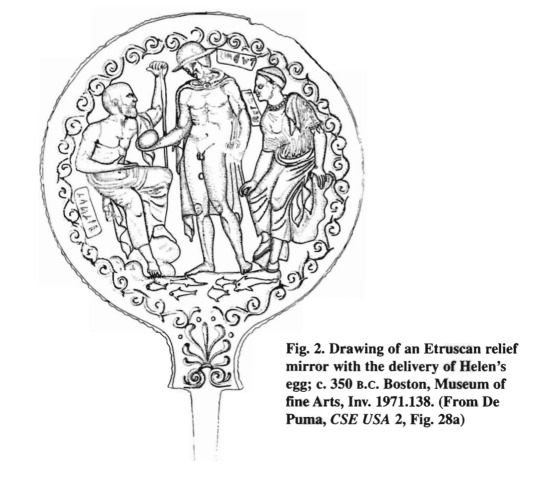
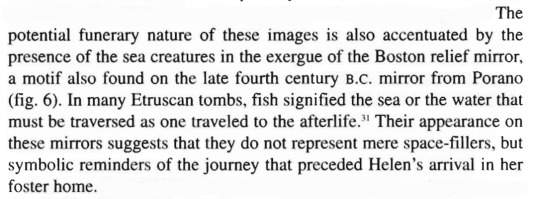
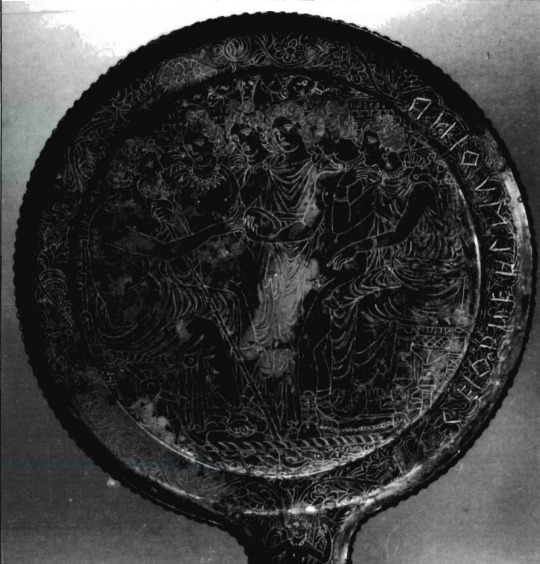
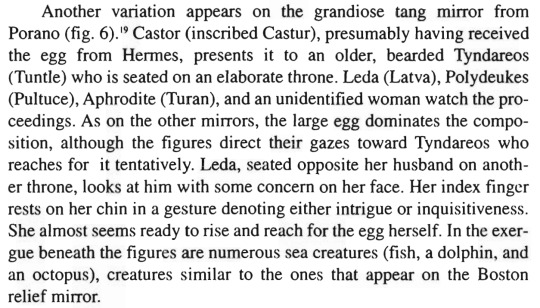
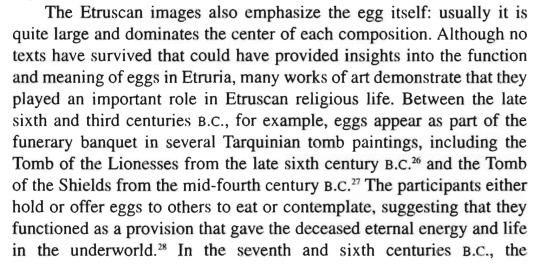
Carpino, Alexandra (1996) "The Delivery of Helen's Egg: An Examination of an Etruscan Relief Mirror," Etruscan Studies: Vol. 3 , Article 2.
Literally knowing of death before her life has begun.
#helen of sparta#nemesis#leda#tyndareus#hermes#dioscuri#etruscan#ancient mythology#this raises SO many questions. how long does the egg stay down there for? Immediately after being laid or just before it's going to hatch??#what counts as her birth 'home'? where she was laid? or where she was hatched? why are the answers to both of these questions 'yes'?#helen daughter of an underworld goddess and olympian god strikes once again. she's got so much range darling.#highly recommend reading the whole article btw. It's very interesting stuff. I feel like I haven't done it the justice it deserves here >_>
23 notes
·
View notes
Text
Random one: How many children do you have? Tyndareus: Biologically, legally or emotionally?These are three different quantities
#greek mythology#incorrect greek mythology#greek heroes#incorrect greek heroes#incorrect greek quotes#incorrect quotes#iliad#incorrect iliad#tyndareus
59 notes
·
View notes
Text
Favourite Performances from the 2003 Miniseries "Helen of Troy"
Rufus Sewell as Agamemnon, although he is villainized beyond belief, he still feels like a real person to me, not like a cardboard demon.
Daniel Lapaine as Hector, literally the only Hector besides John Shrapnel I did not find average at best. I found Harry Andrews average at best, I found Jacques Bergerac average at best, I found Eric Bana average at best, like their performances could have been done by literally anyone else and it would come out the same, something you don't get from Daniel Lapaine and John Shrapnel, they are fantastic performances only they could give.
John Rhys-Davies as Priam, the performances given by the actors playing Priam are typically fantastic and John is no exception.
Stellan Skarsgard as Theseus, there have been many great portrayals of Theseus and sure, this is a kinder portrayal than he would have been in that stage of life, but it feels like this is actually Theseus come to life.
Emilia Fox as Cassandra, she does a really good job and it must be in the blood since her father Edward Fox is also a fantastic actor.
Richard Durden as Tyndareus, literally the only screen portrayal of Tyndareus I've ever seen, so it isn't like there is much to choose from, but even then he does a great job with what screen time he has.
Jim Carter as Pirithous, I've always loved his work, he's in one of my favourite movies and he gives a great performance with what little screen time he has.
Overall, it is strange. I always take the Achaean side, but here I find myself taking the Trojan side, probably because out of individuals on the Trojan side, more of the best performances in the miniseries come from those on the Trojan side rather than on the Achaean side, out of my favourite performances, Agamemnon is the only Achaean who was involved in the war.
#helen of troy#helen of troy 2003#agamemnon#hector of troy#priam#theseus#cassandra#tyndareus#pirithous
0 notes
